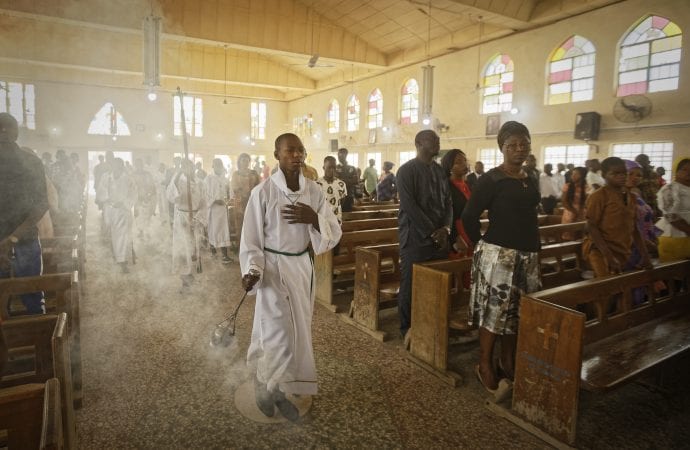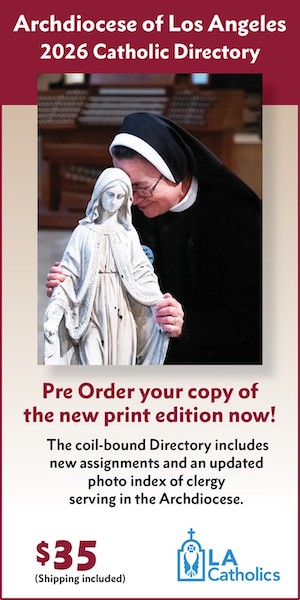For one Nigerian priest, the killing of several of his peers over the past few months is not so much a sign that Christians are being targeted as it is indicative of a much deeper, and systemic problem.
So far in 2019, some 11 priests have been killed throughout Africa, three of whom were from Nigeria.
According to Father Valentine Obinna, a priest of the Aba diocese in Nigeria, his fallen brethren are the latest casualties in a cycle of violence that has gripped the whole of Nigeria in recent years - a cycle he says that is rooted in corruption and a “hidden agenda” that got out of control.
Speaking to Crux about the death of Father David Tanko, whose Aug. 29 murder followed that of Father Paul Offu earlier that month, Obinna said “I wouldn’t say that priests particularly are targets, but I would say they are victims of the barbaric situation (happening) at the moment.”
Though they are not a minority in Nigeria, representing roughly half of the population, Christians in the country have faced harsh persecution in recent years on multiple fronts, primarily from Islamic terrorist group Boko Haram and Fulani herdsman, the majority of whom are Muslim and have attacked Christian villages on grounds that they are searching for grazing territory for their cattle.
Local tribal conflicts have compounded the issue, making it more dangerous not just for Christians, but for everyone, Obinna said.
Obinna said in some cases, it is advocacy from the pulpit which has landed some priests either in the hands of kidnappers, or in the grave. Yet he believes the reason Boko Haram and the Fulani have seemingly had free reign to wreak havoc and that they continue to remain at large is due to government failure.
“When we talk about killings in Nigeria generally, apart from Boko Haram we have these Fulani herdsmen, who are really strong right now,” he said, explaining that the Fulani are expanding “because of how the president in particular has handled the issue.”
In his view, Obinna said he believes there is “a hidden agenda” at play among Nigeria’s ruling class, which is “the Islamization of Nigeria.”
“People read the handwriting on the wall,” he said.
“It’s obvious. It’s underground. It’s trying to make the whole country a Muslim country. But they are trying to do that in a context with a strong presence of Christians, and that’s why it becomes very difficult for him,” he said, referring to Nigerian President Muhammadu Buhari.
If Christians have become targets at all, it is because Buhari and those in power “want to make sure the whole country becomes a Muslim country,” and they are using Boko Haram and the Fulani to achieve that objective, he said.
Obinna said he believes that when Boko Haram first began to gain global attention in the early 2000s, they were more “politically minded,” and received political support from certain parties in order to advance a personal agenda.
“It was only a political strategy they wanted to use at the time, using Boko Haram for their personal and political achievements,” he said, adding that it benefitted them at the time, but soon things got out of hand and “they were unable to control the situation.”
When former Nigerian President Goodluck Jonathan, who held office from 2010-2015, was still in charge, Obinna said he believes Jonathan made a “genuine effort” to get things under control, “but the system is so corrupt that the system didn’t allow him to achieve much.”
“He was too gentle to be in that political position,” Obinna said. This gentleness, he said, “would have been something positive for Nigeria, if the system had allowed him to use his gentle nature” to build the Nigeria he envisioned.
“But the system that he built was stronger than his will, and that’s why he couldn’t do much, especially with Boko Haram,” he said, noting that this system, the pressures of systemic corruption, and the threat of violence from extremist groups have made many people afraid.
People who would normally speak out about the situation, including Christians, have “shut up” about it, “because they don’t want to become a victim,” Obinna said. “They don’t do anything, they don’t say anything, they are incapacitated. They don’t want to die.”
The same goes for Catholics, who make up some 30 percent of the Christian population in Nigeria, he said. Regular churchgoers are for the most part silent, and for those inside the system, they know what they are doing at times is wrong, but the pressure they often face forces them to make compromising decisions.
This pressure “is stronger than…so many Nigerians, Muslims and Christians alike, who ordinarily want it to be different, who want to practice their faith,” but who buckle under their fear of reprisal.
Obinna faults Nigeria’s political system as the reason the country, whose abundant natural resources ought to place it among the top leading economies in the world, is stuck in a rut with renegade groups that it can’t control slaughtering its citizens.
“If they want to, (those in power) have the resources to (stop it),” he said. “But the system is so bad, that once you get in there, meeting this strong corrupt system, if you are not strong enough, they will undo you, render you incapacitated.”
Obinna said Christians have long put pressure on political leaders to effect change, but this pressure “has not been enough.”
“The corrupt system…is stronger than every effort the Church is making, than every pressure the Church is putting,” he said, “But the Church keeps making effort.”
These efforts, he said, are primarily focused on education and creating job training and opportunities for young people, many of whom are fed up with the state of their country.
“Everybody sees that we have the resources that will give them good work, to have a good life, but they are denied it. That’s why they are really agitated,” he said. “The youth want a better life.”
One thing the Church is doing in order to get ahead of the situation is creating empowerment and skill-training programs to help ensure youth get jobs, Obinna said, explaining that the Church is trying to create a new system with no place for disillusionment, and where young people have hope and opportunities.
Many of Nigeria’s major dioceses, including the Archdioceses of Abuja and Jos, have created youth centers dedicated to creating employment schemes and offering job training and are urging both the government and other organizations, religious and non-religious, to get engaged.
Obinna said this will be tough for many young people as they face “a strong godfatherism in the political system in Nigeria.” However, despite the hurdles, Obinna said he “will not give up on the hope that some of them will make an impact.”
“Nigerians are creative. If they want to achieve something, they will use many means,” he said, voicing his hope for the long-term future of Nigeria, “especially with the younger generation.”
“I wouldn’t say it is a system that will keep going forever, that we’re doomed for life,” he said, adding. “Hope is the only thing that shouldn’t die.”

